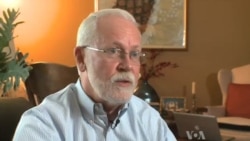Henry Huot has kept the implements from his 17 years as priest in a rural New Hampshire diocese.
“This is the chalice I used for daily Mass, actually, given to me by my parents,” he said, removing a pewter goblet from its black case. “I kept it, and will keep it, for the rest of my life.”
He gave up the ministry 22 years ago.
“Gradually what happened is my sexual desires, my sexual attractions, became more keenly felt, and I had to deal with them,” he said, adding that while he was always attracted to men, he didn’t act on it as priest.
“For myself, and I think there were others like me, we just kind of put sexuality on the shelf, and our pastoral work filled our days," he said.
He even tried counseling. Now he is a social worker and lives with his longtime partner in an apartment in a suburb of Washington.
And he’s been transfixed by the coverage of the comments the Pope made on the way back from a visit to Brazil. Francis spent 80 minutes talking to reporters on the plane about a wide range of subjects, and he answered a question about gay clergy with a nonjudgmental reflection.
“If a person is gay and seeks the Lord and has good will, who am I to judge him?,” said the pontiff.
That comment, as well as others about the role of women and his plans to reform the Vatican bank, have cast Francis as a new kind of pope. But while the Roman Catholic hierarchy was emphasizing that he has not changed any doctrine, Huot said, for a leader of the Roman Catholic Church merely to use the word "gay" was significant.
“It’s huge,” said the former clergyman. “I mean, it doesn’t come across as clinical anymore, or ‘Vaticanese.’”
The last pope said gay men should not become priests and described homosexual attraction as “objectively disordered.”
Huot believes the new pope eventually will make changes, although he himself is happy with his new life as a social worker. As he puts away his paraphernalia, he opens his old sacraments book one more time and reads the exhortation said at the end of Mass.
“Go in peace to love and serve the Lord.”
“This is the chalice I used for daily Mass, actually, given to me by my parents,” he said, removing a pewter goblet from its black case. “I kept it, and will keep it, for the rest of my life.”
He gave up the ministry 22 years ago.
“Gradually what happened is my sexual desires, my sexual attractions, became more keenly felt, and I had to deal with them,” he said, adding that while he was always attracted to men, he didn’t act on it as priest.
“For myself, and I think there were others like me, we just kind of put sexuality on the shelf, and our pastoral work filled our days," he said.
He even tried counseling. Now he is a social worker and lives with his longtime partner in an apartment in a suburb of Washington.
And he’s been transfixed by the coverage of the comments the Pope made on the way back from a visit to Brazil. Francis spent 80 minutes talking to reporters on the plane about a wide range of subjects, and he answered a question about gay clergy with a nonjudgmental reflection.
“If a person is gay and seeks the Lord and has good will, who am I to judge him?,” said the pontiff.
That comment, as well as others about the role of women and his plans to reform the Vatican bank, have cast Francis as a new kind of pope. But while the Roman Catholic hierarchy was emphasizing that he has not changed any doctrine, Huot said, for a leader of the Roman Catholic Church merely to use the word "gay" was significant.
“It’s huge,” said the former clergyman. “I mean, it doesn’t come across as clinical anymore, or ‘Vaticanese.’”
The last pope said gay men should not become priests and described homosexual attraction as “objectively disordered.”
Huot believes the new pope eventually will make changes, although he himself is happy with his new life as a social worker. As he puts away his paraphernalia, he opens his old sacraments book one more time and reads the exhortation said at the end of Mass.
“Go in peace to love and serve the Lord.”





